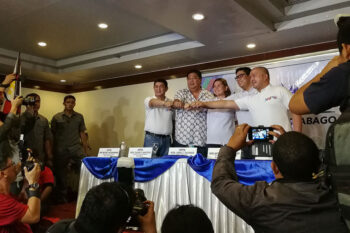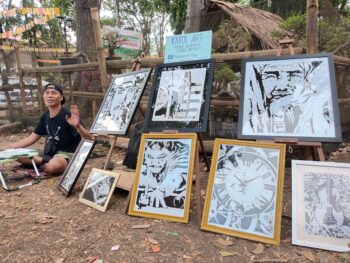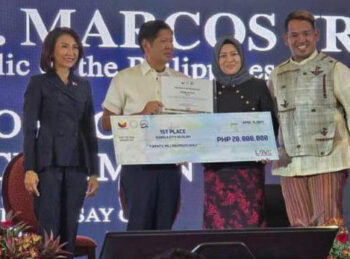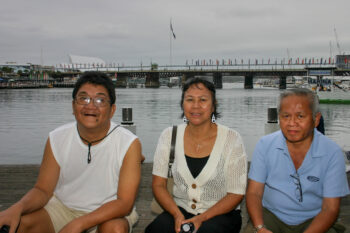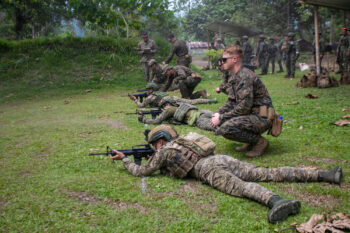ZAMBOANGA CITY (MindaNews/07 May) – May 6 was declared the commencement of fasting (Arabic ‘sawm’, plural ‘siyam’) in the month of Ramadhan of the Hijri or Islamic calendar. The declaration in this part of the Muslim World was done by the Regional Darul-Ifta’ in the BARMM and outside by respective Darul-Ifta’ bodies such as the Darul-Ifta’ of Zamboanga Peninsula and Palawan and the Mufti of Davao City after the mandatory physical sighting exercise. The declaration over the weekend was immediately circulated on social media and received by the faithful with such greetings as ‘Ahlan Ramadhan’ (Welcome Ramadhan), ‘Ramadhan Mubarak’ (Blessed Ramadhan) and ‘Ramadhan Saīd’ (Happy Ramadhan).
For around 28 days, the days will be marked by fasting and the nights by tarawīh prayers. The fast commences before the early morning Fajr prayer until sunset with observants refraining from food, drinks and smoking; married couples from intercourse; shying away from gossips and idle talks; and devoting more time for obligatory and optional salat (prayers), du’a (supplication), dhikr (remembrance), qira’atul Qur’an (Qur’an reading), tilawatil Qur’an (Qur’an recitation), and the like.
Moro children are enthusiastic as they are attracted to the variety of food on the table. Whilst they participate in fasting, they are not yet obligated yet. Instead, their participation is to familiarize and practice them so that they are able to do so properly when they reach the obligatory age. Children, pregnant women and infirmed are normally exempted from this obligation.
Further, during the month of Ramadhan, Moro families are generally generous with food and monies. The food prepared for daily iftar (breaking of the fast) is shared with kith and kin. Where unable to prepare food, money is extended. Islam reminds the faithful to remember, to invite and be generous with orphans and those who have less in life. After all, among the many intents of fasting is for those who have more in life to experience the life of those who have less; consequently, Muslims come out of Ramadhan emphatic, humble, grateful, frugal and generous. But the fundamental teaching of fasting is taqwa or God-consciousness, to be attracted to His worship and to fear the consequences of religious inaction. It is this taqwa that is suppose to bind all Moros under the Islamic faith.
Furthermore, since embracing Islam, the 13 Moro ethnolinguistic groups had observed fasting in the month of Ramadhan as integral practice of their Moro identity and culture. While observing the core teachings of Islam pertaining to fasting, every ethnic group have added their own ethnic variations, such as the preferred local foods. Among the Moros of the Sulu Archipelago and Zamboanga Peninsula, seafoods are a hit as iftar food together with ‘bang-bang’ or native delicacies of all kinds. For sahūr, the last meal before the early morning prayer, ‘sabaw maimû’ (hot and sweet coconut milk soup) is popular. Although, the Sunnah (practice) of the Prophet Muhammad SAW is to eat dates to break the fast. Dates is now easily accessible especially in urban areas where it is often distributed in mosques and by religious organizations or on sale in local barter trade stores.
Ramadhan is not just fasting. It is supposed to reinforce Muslim unity and empathy. Thus, there is a need to reiterate its importance among the 13 ethnolinguistic groups and burgeoning religious diversity. There is also the imperative to revisit this cultural practice in order to be a source of unity, and in order to avoid divergent discourses and division.
Fasting in the month of Ramadhan does not follow the Gregorian calendar, it follows the Islamic hijri calendar. Since the Bangsamoro does not have its hijri calendar, every Moro group either adopts its own or import one from overseas as their reference. The hijri calendar like the traditional Chinese Yinlee calendar is lunar-based, that is following the different phases of the moon. Thus, hilāl or moon-sighting is necessary to move from one month to another, year-round, not just before the start or end of the month of Ramadhan. However, because of logistical and organizational constraints to carry out these tasks and with loss of their patron, the practices are now limited to the observance of fasting only.
The Gregorian calendar that is dominant in the Philippines is solar-based, that is based on the seasons and the relative position of the sun. This is why, there is a (mis)conception that the month of Ramadhan is moving across the Gregorian calendar. One value of the lunar-counting is that the observance of the fast is not fixed on a particular season. Ramadhan is from the Arabic root word ‘ra-ma-dha’ meaning scorching heat or dryness. Imagine observing fast on a fixed hot season? Because the Hijri counting is lunar-based, the fasting month of Ramadhan can move across the seasons.
In the time of the old monarchy, the Sultan was the ecclesiastical authority and certain procedures and practices were observed uniformly across the realm. When the Sultan’s power was taken over by the Americans, ecclesiastical practices lost their patron and saw their decline. Thus, the need to re-institutionalize two traditional practices associated with fasting and the month of Ramadhan – the practice of taqwīm or Islamic hijri calendar and hilāl or moon-sighting.
The establishment of the BARMM can re-institutionalize these cultural practices by adopting uniform standards and hiring professionals to carry them out properly. This is the call of the ulama headed by the Aleem Abdulmuhmin Mujahid, former executive director of the ARMM Regional Darul-Ifta’ (RDI) and current BTA member. Re-institutionalization means adoption of a legal framework for the uniform observance of hilāl, the development of its own BARMM hijri or lunar taqwīm or calendar, training professionals with the necessary ulūmiyyah (technical) and diniyyah (religious) qualifications, and the establishment of a taqwīm and hilāl bureau under the Ministry of Science and Technology (MOST) to sustain these practices. It should similarly be clarified that while the proposed bureau undertakes these practices, the official pronouncement should be coordinated with and come either from the offices of the BARMM Darul-Ifta’, the region’s jurisconsult authority or the Wali, the BARMM’s titular head.
Worth mentioning and adopting by this proposed bureau are some of the practices demonstrated by ARMM RDI – such as the annual hilāl conference, mobilizing provincial teams to undertake hilāl, upgrading and additional procurement of moon-sighting equipment and software, developing technical qualifications of young ulama in partnership with the national DOST PAGASA office, and importantly, consultation and consensus building among varied darul-ifta’ bodies, organizational muftun and influential ulama.
While this proposition is not in the priority legislation for BTA, its early adoption can signal the re-emergence and recognition of positive traditional practices that make Bangsamoro what it is, thereby promoting cultural identity, unity and heritage among the Moro inhabitants.
(MindaViews is the opinion section of MindaNews. Noor Saada is a Tausug of mixed ancestry – born in Jolo, Sulu, grew up in Tawi-tawi, studied in Zamboanga and worked in Davao, Makati and Cotabato. He is a development worker and peace advocate, former Assistant Regional Secretary of the Department of Education in the Autonomous Region in Muslim Mindanao, currently working as an independent consultant and is a member of an insider-mediation group that aims to promote intra-Moro dialogue).



